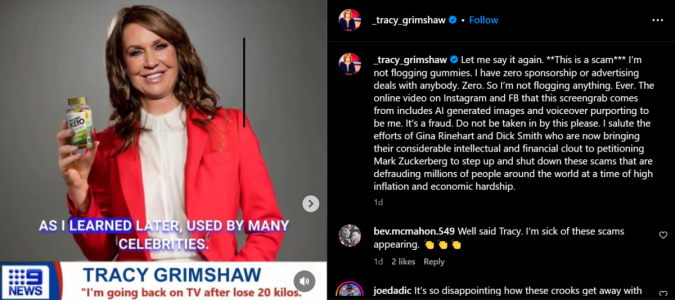Tracy Grimshaw exposes scammers as behind deceptive weight loss ‘endorsement’ on social media
By
- Replies 9
Renowned Australian television presenter Tracy Grimshaw has recently become the target of online scammers who have been using her image and voice in a fraudulent advertisement promoting diet gummies.
The 63-year-old veteran journalist took to social media to warn her fans and followers about the deceptive campaign circulating on various online platforms.
In her post on social media, Grimshaw shared a screenshot from the counterfeit video, which features a computer-generated image of her holding a jar of keto gummies and smiling.
The ad also includes text in broken English, supposedly quoting Grimshaw, stating: 'I'm going back on TV after [sic] lose 20 kilos.'
In her post, Grimshaw firmly stated, 'Let me say it again. **This is a scam*** I’m not flogging gummies. I have zero sponsorship or advertising deals with anybody. Zero. So I’m not flogging anything. Ever.'
She further warned her followers not to be deceived by the online video, which includes AI-generated images and voiceover purporting to be her.
Grimshaw expressed her frustration, revealing that this was the second time in six months that she has been targeted by scammers promoting the same product.
You can read more about Tracy’s first time slamming the deceptive scam here.
She also acknowledged Australia's wealthiest woman, Gina Rinehart, and famed Australian entrepreneur, Dick Smith, in her post.
Both Rinehart and Smith have also fallen victim to AI-generated fake ads in recent years and have taken action by writing a letter to Facebook CEO, Mark Zuckerberg, urging him to address the issue of scam advertisements on the platform.
The issue of online scams using the images and names of celebrities is not new. Over the past few years, such fraudulent campaigns have targeted several high-profile individuals.
In 2018, the Australian Competition and Consumer Commission (ACCC) issued a warning against fake ads and listed Australian celebrities whose names and images have been used to endorse false products.
The list includes superstar Cate Blanchett, Deborah Knight, Delta Goodrem, Jessica Rowe, and Kyle Sandilands.
Also listed as victims of scammers were former Project star Lisa Wilkinson, Hollywood legend Nicole Kidman, and Logie winner Sonia Kruger.
Former Sunrise host David Koch and current host Natalie Barr have also been victims of online scams linked to cryptocurrency.
In Koch’s case, the fraudulent activity caused by the scam became so severe that the respected media figure sought recourse against social media platforms for allegedly allowing these scams to flourish without adequate regulation.
Understanding Online Scams and How to Avoid Them
Online scams have become increasingly sophisticated, often using the names and images of celebrities to lure unsuspecting victims.
Despite taking on various forms, the goal is always the same: to trick people into parting with their money.
Here are some tips to help you avoid falling victim to online scams:
1. Be sceptical: If something seems too good to be true, it probably is. Be wary of ads or emails offering products at incredibly low prices or investment opportunities promising high returns.
2. Do your research: Before purchasing a product or investing in an opportunity, do some research. Look for reviews or news articles about the product or company. If it's a scam, chances are someone else has already reported it.
3. Check the source: Scammers often impersonate celebrities or reputable companies. Check the official social media accounts or websites of these individuals or companies to see if they have endorsed the product or investment opportunity.
4. Protect your personal information: Never provide personal or financial information in response to an unsolicited email or ad. Scammers can use this information to steal your identity or drain your bank account.
5. Report scams: If you come across a scam, report it to the ACCC's Scamwatch. Your report can help protect others from falling victim to fraud.

To learn more about scams and how to avoid them, you can take a look at our Scam Watch forum here.
Remember, knowledge is power. By staying informed and vigilant, you can protect yourself from online scams.
Have you seen some of the scam ads perpetrated by scammers using the images of these celebrities? Let us know in the comments below!
The 63-year-old veteran journalist took to social media to warn her fans and followers about the deceptive campaign circulating on various online platforms.
In her post on social media, Grimshaw shared a screenshot from the counterfeit video, which features a computer-generated image of her holding a jar of keto gummies and smiling.
The ad also includes text in broken English, supposedly quoting Grimshaw, stating: 'I'm going back on TV after [sic] lose 20 kilos.'
In her post, Grimshaw firmly stated, 'Let me say it again. **This is a scam*** I’m not flogging gummies. I have zero sponsorship or advertising deals with anybody. Zero. So I’m not flogging anything. Ever.'
She further warned her followers not to be deceived by the online video, which includes AI-generated images and voiceover purporting to be her.
Grimshaw expressed her frustration, revealing that this was the second time in six months that she has been targeted by scammers promoting the same product.
You can read more about Tracy’s first time slamming the deceptive scam here.
She also acknowledged Australia's wealthiest woman, Gina Rinehart, and famed Australian entrepreneur, Dick Smith, in her post.
Both Rinehart and Smith have also fallen victim to AI-generated fake ads in recent years and have taken action by writing a letter to Facebook CEO, Mark Zuckerberg, urging him to address the issue of scam advertisements on the platform.
The issue of online scams using the images and names of celebrities is not new. Over the past few years, such fraudulent campaigns have targeted several high-profile individuals.
In 2018, the Australian Competition and Consumer Commission (ACCC) issued a warning against fake ads and listed Australian celebrities whose names and images have been used to endorse false products.
The list includes superstar Cate Blanchett, Deborah Knight, Delta Goodrem, Jessica Rowe, and Kyle Sandilands.
Also listed as victims of scammers were former Project star Lisa Wilkinson, Hollywood legend Nicole Kidman, and Logie winner Sonia Kruger.
Former Sunrise host David Koch and current host Natalie Barr have also been victims of online scams linked to cryptocurrency.
In Koch’s case, the fraudulent activity caused by the scam became so severe that the respected media figure sought recourse against social media platforms for allegedly allowing these scams to flourish without adequate regulation.
Understanding Online Scams and How to Avoid Them
Online scams have become increasingly sophisticated, often using the names and images of celebrities to lure unsuspecting victims.
Despite taking on various forms, the goal is always the same: to trick people into parting with their money.
Here are some tips to help you avoid falling victim to online scams:
1. Be sceptical: If something seems too good to be true, it probably is. Be wary of ads or emails offering products at incredibly low prices or investment opportunities promising high returns.
2. Do your research: Before purchasing a product or investing in an opportunity, do some research. Look for reviews or news articles about the product or company. If it's a scam, chances are someone else has already reported it.
3. Check the source: Scammers often impersonate celebrities or reputable companies. Check the official social media accounts or websites of these individuals or companies to see if they have endorsed the product or investment opportunity.
4. Protect your personal information: Never provide personal or financial information in response to an unsolicited email or ad. Scammers can use this information to steal your identity or drain your bank account.
5. Report scams: If you come across a scam, report it to the ACCC's Scamwatch. Your report can help protect others from falling victim to fraud.
Key Takeaways
- TV veteran Tracy Grimshaw has warned fans about online scammers using her image and voice in a fake diet gummy ad on social media.
- Grimshaw pointed out that the online video includes AI-generated images and a voiceover purporting to be her, which she clarified is fraudulent.
- This is the second time Grimshaw has been targeted by similar scams.
- Other celebrities, including Gina Rinehart and Dick Smith, have also fallen victim to AI-generated fake ads, prompting them to petition Facebook to take action.
To learn more about scams and how to avoid them, you can take a look at our Scam Watch forum here.
Remember, knowledge is power. By staying informed and vigilant, you can protect yourself from online scams.
Have you seen some of the scam ads perpetrated by scammers using the images of these celebrities? Let us know in the comments below!








